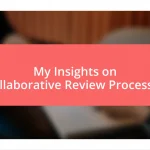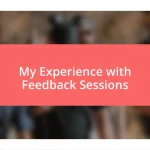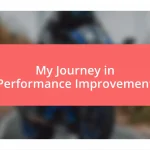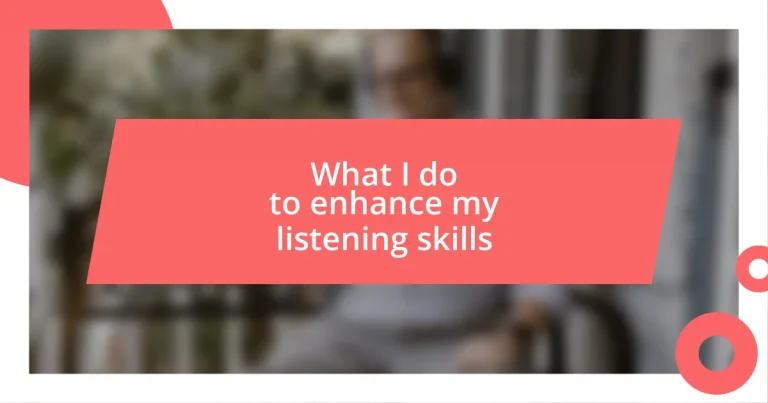Key takeaways:
- Active listening enhances emotional connections and fosters deeper relationships by focusing on understanding the speaker’s perspective and feelings.
- Implementing techniques like mindfulness, reflective listening, and maintaining a distraction-free environment significantly improves overall listening skills.
- Seeking feedback, self-assessing, and keeping a listening journal help identify areas for improvement and track progress in developing better listening habits.
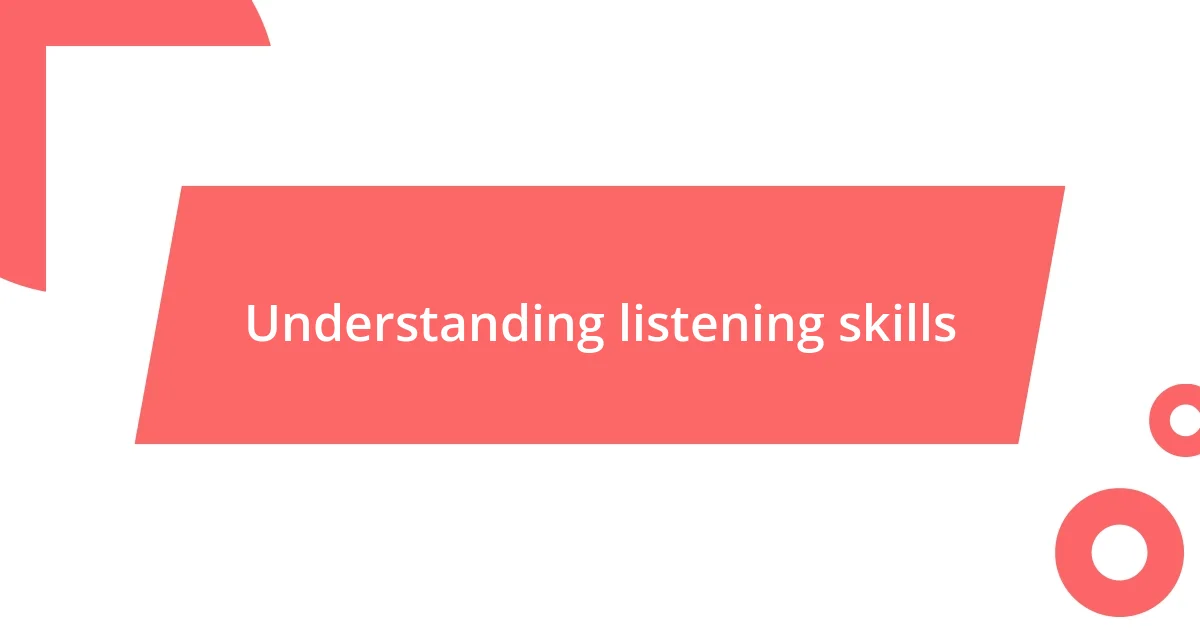
Understanding listening skills
Listening skills are often overlooked, yet they are crucial in building effective communication. I remember a time when I was in a heated discussion with a friend; instead of waiting for my turn to speak, I made a conscious effort to listen. The moment I shifted my focus from my response to truly understanding their perspective, everything changed. Isn’t it interesting how just being present can transform a conversation?
Listening is more than simply hearing words; it’s about grasping the emotions and intentions behind them. When I actively listen, I notice the nuances in tone and body language that add depth to the spoken word. Have you ever found yourself feeling more connected to someone after really hearing them? In my experience, that connection often leads to deeper relationships and a greater sense of empathy.
Moreover, good listening involves asking the right questions to demonstrate genuine interest. I’ve found that when I inquire further into what someone means, it not only shows I care, but it also deepens my understanding. For example, during a team meeting, I once asked a colleague to elaborate on their idea instead of just nodding along; this led to a richer discussion and sparked creative solutions. How often do we miss out on insights simply because we don’t dig deeper?
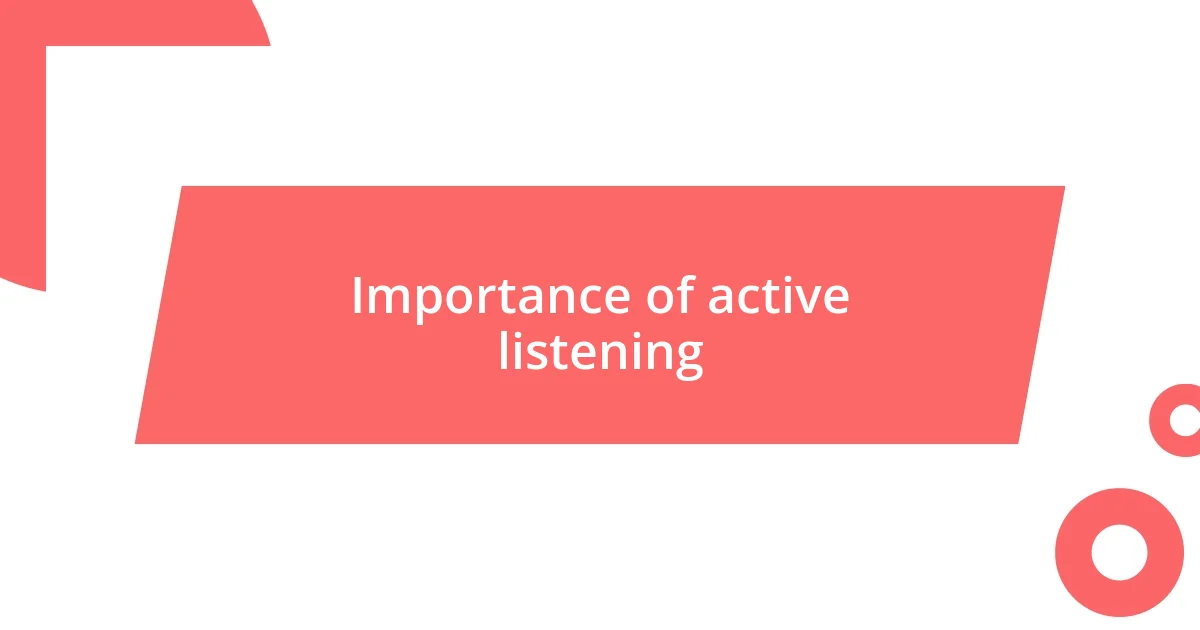
Importance of active listening
Active listening is paramount in fostering meaningful connections. I recall a moment during a family gathering when my niece shared her struggles at school. Instead of dismissing her concerns, I leaned in, making eye contact and nodding encouragingly. That subtle shift in my attention made her feel valued, and she opened up like never before. I realized then that active listening isn’t just a skill; it’s a bridge to understanding others on a deeper level.
When I engage in active listening, I am not only hearing words but also absorbing the feelings behind them. During a training session, a colleague expressed frustration over a project delay. By genuinely reflecting on our discussion and validating her feelings, I sensed the air shift. It felt like we were no longer just coworkers. We became allies, navigating challenges together. This emotional connection can turn a simple conversation into a profound experience.
The benefits of active listening extend to both personal and professional realms. I often remind myself that every conversation is an opportunity. Even in challenging discussions, such as feedback sessions, when I focus on active listening, the outcomes tend to be constructive. I can see the difference in how others respond; they become more open and willing to share, creating an atmosphere of trust and collaboration.
| Active Listening | Passive Listening |
|---|---|
| Engages fully with the speaker | Only hears words without engagement |
| Builds deeper connections | May lead to misunderstandings |
| Encourages open dialogue | Can create a one-sided conversation |
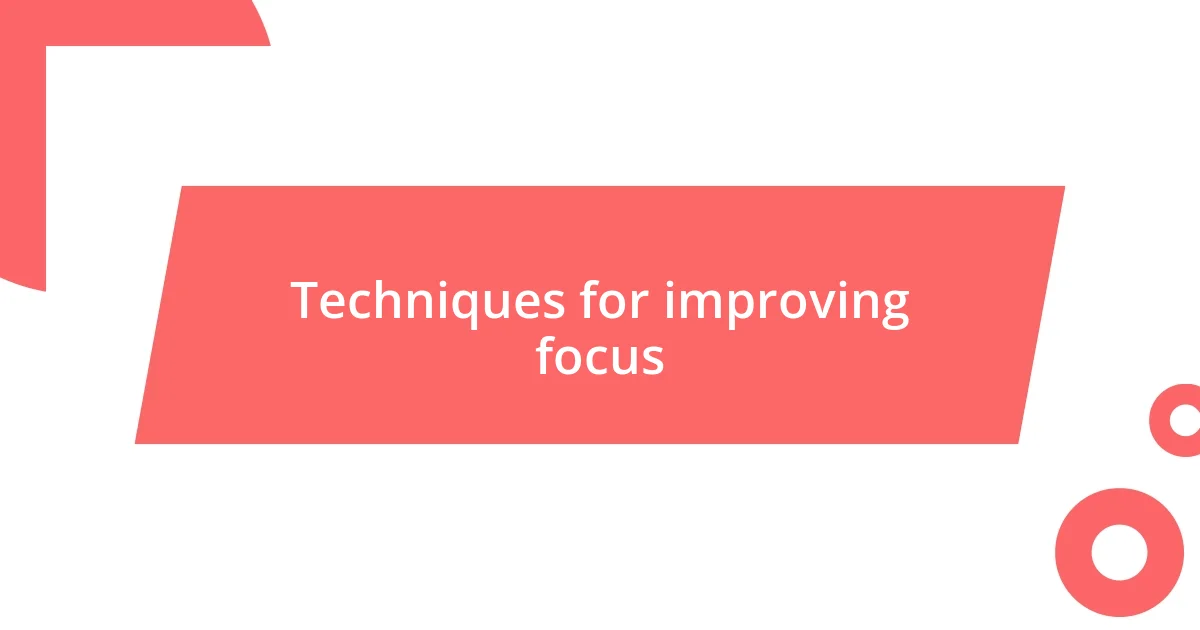
Techniques for improving focus
Improving focus is essential for enhancing listening skills. One technique that has worked wonders for me is creating a distraction-free environment. When I’m in a busy coffee shop, I often find myself tuning out the world by using noise-canceling headphones. This simple act helps me zone in on the person I’m speaking with, allowing for a more meaningful interaction. Another strategy I really enjoy is practicing mindfulness; it trains my mind to stay present in the moment. I often engage in short, focused breathing exercises before conversations, which grounds me and clears away any racing thoughts.
To enhance my focus even further, I’ve developed a few specific techniques that complement these practices:
- Set Clear Intentions: Before a conversation, I remind myself of the purpose—whether it’s to learn, support, or collaborate.
- Active Body Language: I consciously maintain eye contact and nod to show engagement. This not only reinforces my focus but also encourages the speaker.
- Limit Multitasking: When I’m with someone, I put my phone away and resist the urge to check my emails. Committing to the person in front of me is crucial for truly absorbing what they say.
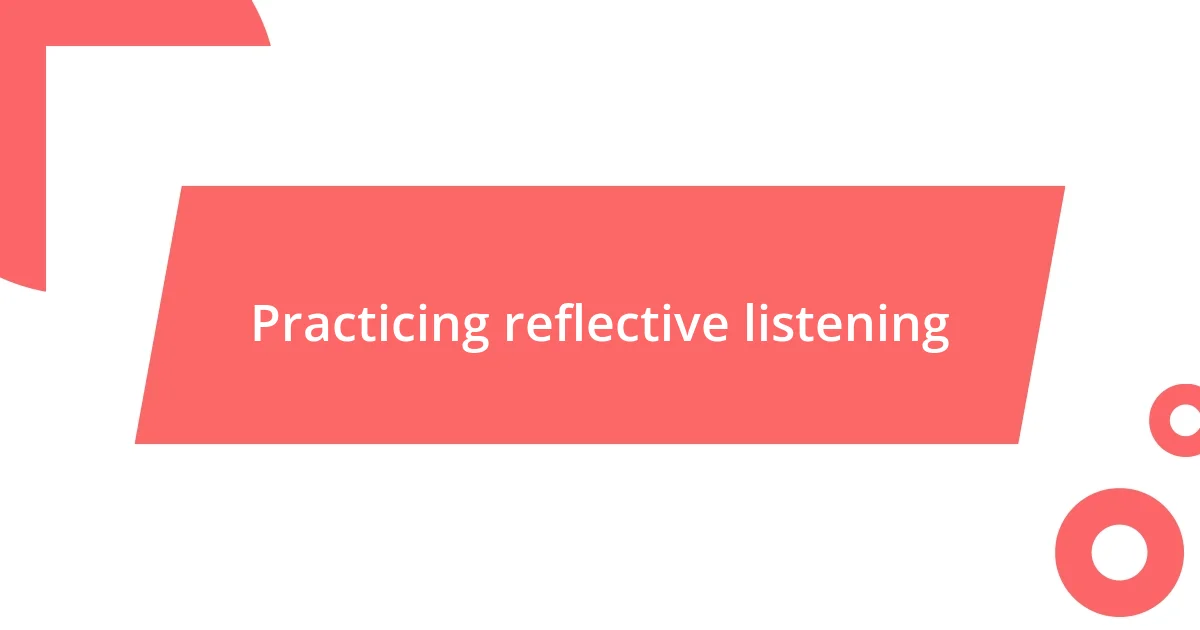
Practicing reflective listening
Practicing reflective listening has been a game-changer in my conversations. I remember chatting with a friend who was going through a tough breakup. Instead of just nodding along, I actively repeated back what she was saying, like, “It sounds like you feel really alone right now.” This technique not only confirmed that I was paying attention but also made her feel truly understood. Have you ever noticed how such validation can shift the energy in a conversation? It opens up a safe space for sharing deeper feelings.
One thing I’ve found essential in reflective listening is the ability to pause. When my teenage nephew was venting about school stress, I took a moment of silence before responding. This brief pause allowed him to articulate his thoughts further, revealing layers I hadn’t anticipated. It struck me then: it’s often not about filling the silence; it’s about giving them room to explore their feelings. I believe that silence can be just as powerful as words in fostering connection.
The more I practice reflective listening, the more I start to feel the emotions behind the words spoken. Engaging with someone’s story not only enhances my empathy but also deepens our relationship. For instance, during feedback sessions with my team, when I acknowledge their viewpoints by reflecting on their feelings, it fosters a sense of collaboration. Isn’t it incredible how simply repeating back someone’s feelings can make them feel valued and heard? In doing so, I find that even challenging conversations turn into opportunities for growth and understanding.
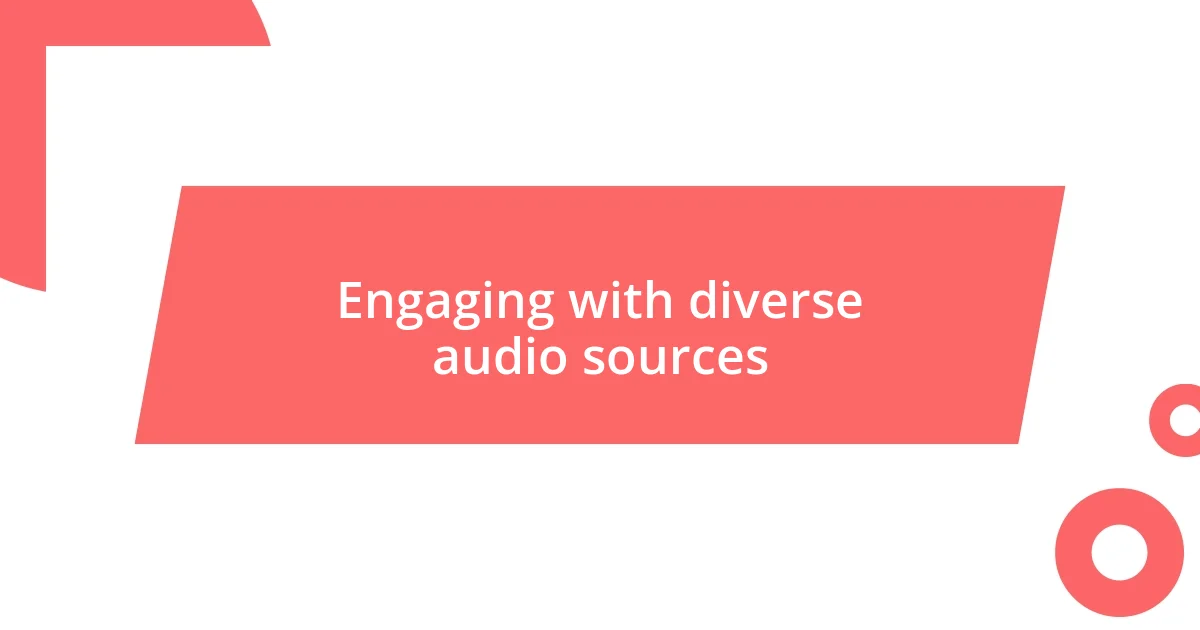
Engaging with diverse audio sources
Engaging with diverse audio sources has enhanced my listening skills in ways I didn’t expect. I often switch between podcasts, audiobooks, and different genres of music to expose myself to various speaking styles and tones. There’s something refreshing about listening to someone with a completely different cadence or accent—it forces me to really pay attention. Have you tried tuning into international news briefings or TED Talks? The variety of perspectives can open your ears to nuances you might normally overlook.
One time, I decided to explore a podcast series featuring interviews with leaders from diverse backgrounds. Listening to their unique experiences not only broadened my understanding but also refined my listening skills. I noticed that the more I engaged with different voices, the better I became at deciphering emotion and intent behind words. It made me question: how often do we limit ourselves with familiar styles? The exposure certainly challenged my assumptions, making me a more active and empathetic listener.
Additionally, attending live events like public speaking sessions and storytelling nights has been transformative. There’s something electric about hearing someone share their story in person, feeling the energy of their voice and emotion. During one such event, I could literally feel the audience’s reaction to the speaker’s pauses and emphases, which deepened my appreciation for the art of listening. These encounters remind me that each voice carries its own rhythm and melody, and it’s in that diversity that I find a richer, more profound listening experience. Wouldn’t you agree that the world offers a symphony of voices just waiting to be heard?
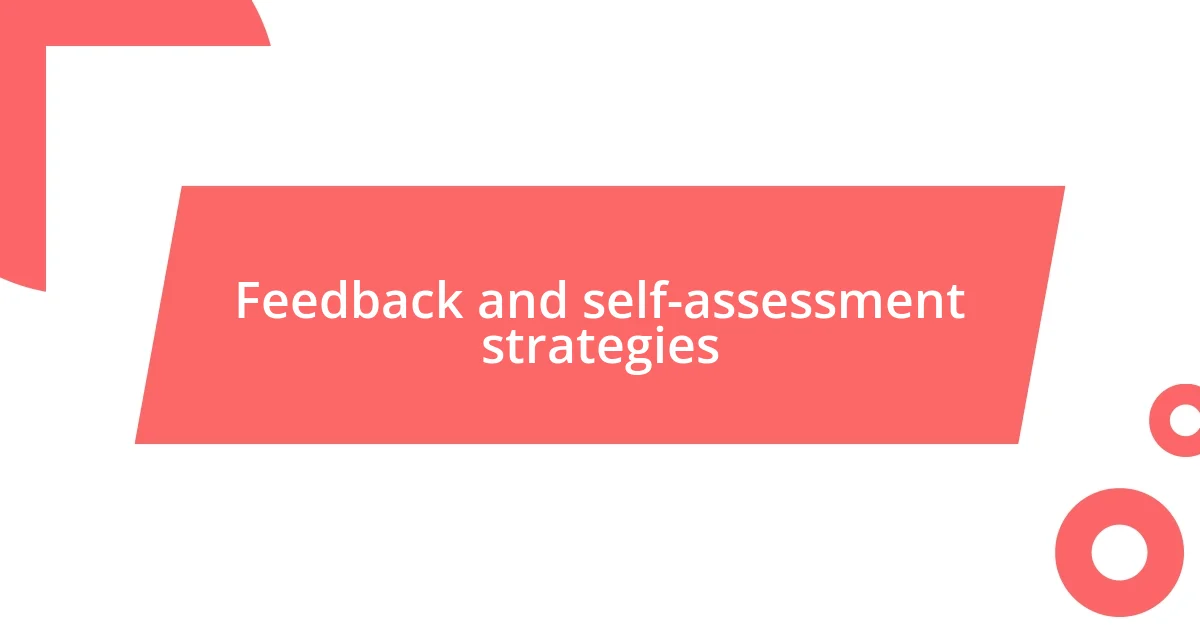
Feedback and self-assessment strategies
When it comes to feedback and self-assessment strategies, I’ve discovered that regularly seeking constructive criticism can be incredibly valuable. After a team meeting, I often ask my colleagues for specific feedback on how I listened during our discussions. Their insights have helped me pinpoint areas where I tend to interrupt or zone out, transforming my approach to our future conversations. Have you ever felt hesitant to ask for feedback? I once was, but it turned out to be a pivotal moment in developing better listening habits.
I also make it a habit to self-reflect after important conversations. At times, I jot down key points in my journal about how effectively I engaged with the other person. For instance, after a heated discussion with my partner about our weekend plans, I later realized I had been so focused on my perspective that I hadn’t really listened to hers. This reflection not only fosters personal growth but helps me commit to being more mindful going forward. It’s interesting to see how written self-assessment can clarify behaviors that affect my listening.
In addition, I find it beneficial to implement small tracking systems to measure my progress over time. For example, I devised a simple scale from one to ten on how well I think I performed in various listening situations throughout the week. What I’ve noticed is that having tangible metrics motivates me to keep improving. Have you ever quantified your listening skills? It’s been eye-opening for me to see how my scores fluctuate and how different contexts require different listening approaches.
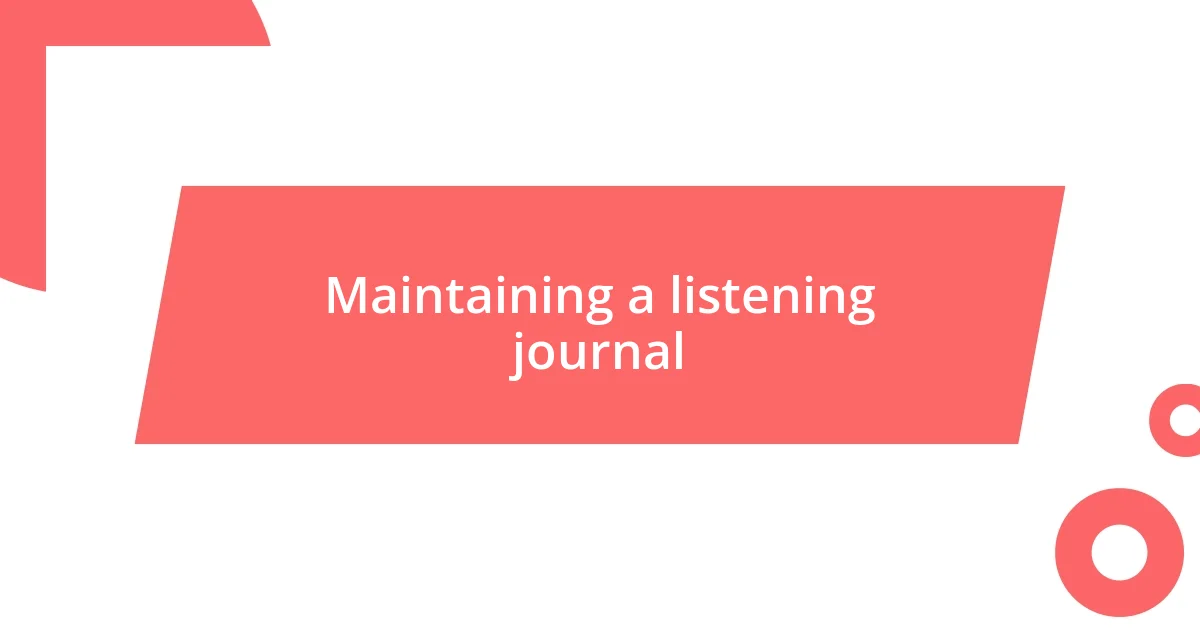
Maintaining a listening journal
Maintaining a listening journal has become a powerful tool in enhancing my listening skills. I started this practice after a friend suggested it to me, and I quickly realized the benefits. Every time I engage in a meaningful conversation, whether it’s with a coworker or during a casual chat with a neighbor, I jot down my thoughts about the interaction. This simple act of writing helps me process what I heard, what I might have missed, and how I felt during the exchange.
I remember a standout moment when I reflected on a deep conversation with a close friend about their struggles. Writing about how intently I listened—and the emotional responses that surfaced—made me conscious of what truly engaged me. It also highlighted how much more I could have done to create a supportive space for my friend. Have you ever thought about how much clearer insights can become when you put pen to paper? For me, it’s like connecting the dots and seeing the bigger picture of my listening journey.
In my journal, I also track specific patterns and challenges that arise in my interactions. I’ll note things like distractions, my emotional state, or recurring themes that come up. This reflection has taught me to be more aware of my tendencies, like letting my mind wander during important moments. By recognizing these patterns, I can actively shift my approach in future conversations. Have you noticed how powerful self-awareness can be in improving communication skills? Each entry in my journal empowers me to refine not just the way I listen, but how I connect with the people around me.

